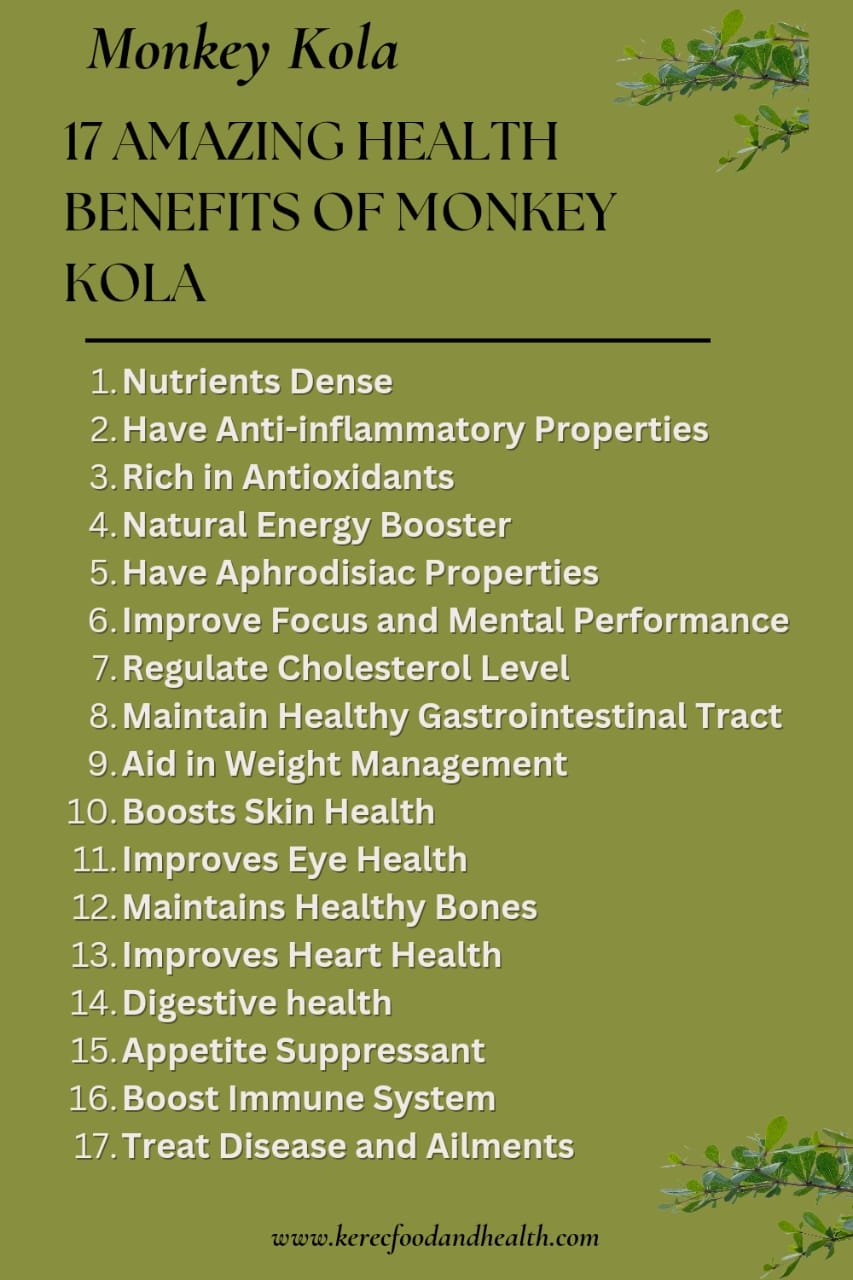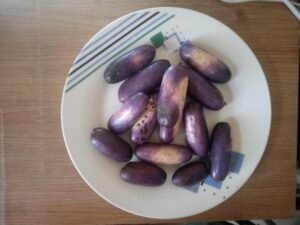Monkey kola, (Cola lepidota), also known as bush cola or monkey cola, is an underrated tropical fruit, has recently been gaining attention for its impressive health benefits. Native to West Africa, this vibrant fruit is not only delicious but also packed with essential nutrients that can boost your well-being. From improving digestion to promoting heart health, monkey kola is a powerhouse of goodness. In this post, we’ll explore 17 incredible health benefits of this fruit, along with its nutritional profile, that make it a must-have in your diet. Whether you’re looking to enhance your nutrition or discover new, natural health remedies, monkey kola has plenty to offer.
Nutritional Value of Monkey Kola
According to the results of Ogbu and Umeokechukwu. 2014. The three types of monkey kola nutritional values are given below:
The Nutritional Value of per 100 g Serving of White Monkey Kola Fruit Contains:
- Moisture: 80.15 g
- Fibre: 1.76 g
- Calories: 58 kcal
- Fats: 0.00 g
- Carbohydrate: 26.7 g
- Crude protein: 1.77 g
- Vitamin C: 13.47 mg
- Vitamin A: 0.27 IU
- Phosphorus: 0.06 mg
- Potassium: 0.14 mg
- Calcium: 0.48 mg
- Magnesium: 0.05 mg
Per 100 g Serving of Yellow Monkey Cola Fruit Contains:
- Moisture: 82.60 g
- Fibre: 1.58 g
- Calories: 55 kcal
- Fats: 0.00 g
- Carbohydrate: 25.8 g
- Crude protein: 1.75 g
- Vitamin C: 11.28 mg
- Vitamin A: 0.25 IU
- Phosphorus: 0.09 mg
- Potassium: 0.19 mg
- Calcium: 0.42 mg
- Magnesium: 0.09 mg
The Nutritional Value of per 100 g Serving of Red Monkey Cola Fruit Contains:
- Moisture: 87.46 g
- Fibre: 1.19 g
- Calories: 32.0 kcal
- Fats: 0.03 g
- Carbohydrate: 25.3g
- Crude protein: 1.15 g
- Vitamin C: 6.37 mg
- Vitamin A: 0.14 IU
- Phosphorus: 0.14 mg
- Potassium: 0.39 mg
- Calcium: 0.18 mg
- Magnesium: 0.22 mg
Additionally, the exact nutritional content of monkey kola can vary depending on factors such as soil conditions, growing methods, and maturity of the plant.
17 Amazing Health Benefits of Monkey Kola
Monkey kola (Cola lepidota), also known as bush cola or monkey cola, is a plant native to tropical regions of West Africa. It has been traditionally used for various medicinal purposes. While scientific research on its health benefits is limited, here are some potential health benefits associated with monkey kola:
1. Nutrients Dense
Monkey cola is an excellent source of manganese, riboflavin, and zinc, which aid in ensuring adequate metabolism as well as other bodily functions.
The presence of riboflavin, folate, Vitamin C, and potassium in monkey kola makes it a great food option for pregnant women.
Monkey cola may also contain minerals like potassium, magnesium, calcium, and iron. These minerals are essential for various bodily functions, including nerve function, bone health, and oxygen transport.
Monkey cola contains vitamin C, vitamins E, and B-vitamins. These vitamins play crucial roles in supporting overall health and immune function.
2. Anti-inflammatory Properties
Some compounds found in monkey cola possess anti-inflammatory properties, which can help reduce inflammation in the body. Chronic inflammation can to various health conditions such as cancer, arthritis, diabetes, and heart disease.
3. Antioxidant Properties
Monkey cola contains various antioxidants such as vitamin C, tannins, flavonoids, terpenoids, phenols, coumarins, and anthocyanins, that can help protect the body against damage caused by harmful free radicals, thereby reducing the risk of chronic diseases like cardiovascular disorders, cancer, and neurodegenerative disorders.
4. Natural Energy Booster
Monkey cola contains natural stimulants like caffeine, theobromine, and theophylline. These can provide a natural energy boost, enhance alertness, and combat fatigue. However, excessive consumption of caffeine can have negative health effects, so it’s important to consume monkey kola in moderation.
5. Aphrodisiac Properties
In some traditional practices, monkey cola is used as an aphrodisiac to enhance sexual performance and libido. However, there is no scientific evidence supporting this claim.
6. Improve Focus and Mental Performance
The stimulant compounds found in Monkey cola, particularly caffeine, may also have a positive impact on cognitive function. Consuming Monkey Kola could potentially improve focus, concentration, and mental performance.
7. Regulate Cholesterol Level
Monkey cola is an excellent source of vitamin B3 (Niacin), that has the potential to decrease the amount of bad cholesterol, known as low-density lipoprotein and improves the high-density lipoprotein (good cholesterol) in the blood.
8. Maintain Healthy Gastrointestinal Tract
Monkey cola is rich in soluble fibers that has the potential to promote the health of the gastrointestinal tract. Their soluble fiber protects the hollow organs connecting the mouth, intestines, esophagus and anus.
9. Aid in Weight Management
Monkey cola is one of the local fruits containing high fiber content, which plays an important role in controlling body weight. Their high fiber and low in calories levels has made it an excellent weight-loss diet.
10. Boosts Skin Health
The high levels of beta-carotene in monkey cola especially the yellow and red varieties can contribute to healthy skin and in making your skin to glow.
Beta-carotene is a precursor of Vitamin A, which has powerful antioxidant properties in enhancing the skin, protects the skin from the effects of ageing, such as wrinkles, repairs and maintains damaged skin cells.
Monkey cola is rich in Vitamin C, which helps to removes wrinkling, fix and repair damaged skin, and keeps your skin glowing and looking younger.
11. Improves Eye Health
The high levels of beta-carotene in monkey cola can be converted to vitamin A, which is crucial for keeping the eye healthy, improving good vision and prevent eye abnormalities that may affect the eye due to vitamin A deficiency. Vitamin A can also help to keep the surface of the eye moist and healthy and causes you see better in low-light conditions.
The leaves of monkey cola are therapeutic and are been used to cure eye infections. This could be attributed to the anti-oxidants properties that are found in them.
12. Maintains Healthy Bones
Monkey cola are good source of calcium, potassium, protein, and vitamin D. Monkey Kola has the potential of building strong bones and teeth, excellent for protein synthesis, proper functioning of the body’s vital cells, organs, and tissues, reduce the effects of acids in the body, retains calcium in the bone, reduces the risk of bone loss and fractures.
Their rich source of potassium may help neutralize acid load and reduce calcium loss from the bone, which has a beneficial effect on bone mineral density. This implies that eating lots of monkey cola can help improve bone health and prevent osteoporosis.
13. Improves Heart Health
Monkey cola is rich in flavonoids, that has the ability to reduce the risk of heart diseases as well as provides essential benefits to heart health.
Monkey kola is super rich in potassium, which plays an important role in the heart. It is very important in keeping your heart to beat properly. It can also prevent the hardening of the arteries, that can result to other heart challenges.
14. Digestive health
Monkey cola has been traditionally used to promote digestive health. It is believed to aid digestion, alleviate gastrointestinal discomfort, and relieve constipation.
Monkey cola contains high levels of dietary fiber, which is important for maintaining a healthy digestive system and promoting regular bowel movements.
15. Appetite Suppressant
Monkey cola has been used traditionally as an appetite suppressant. Some reports suggest that consuming Monkey cola may help reduce cravings and control hunger, which could be beneficial for weight management.
16. Boost Immune System
To strengthen your immune system, you need to take foods that can boost immunity. The high levels of anti-oxidants such as flavonoids and vitamin C, vitamins E, and B-vitamins that is found in monkey kola can help boost the immune system and prevent diseases.
17. Treat Disease and Ailments
Monkey cola have been traditional used to treat ailments such as headaches, stomach issues, and respiratory problems.
The anti-oxidants in Monkey cola helps to fight cancerous cells and all forms of inflammations. They also prevent toxic or harmful substances that can affects the general function of the body.
In Conclusion: It’s important to note that scientific studies on the health benefits of monkey kola are limited, and further research is needed to validate these claims. Additionally, like any herbal remedy, it’s crucial to consult with a healthcare professional before using it as a treatment for any health condition.
Source
- About Health Benefits and Nutritional Value of Yellow Monkey Kola. https://www.finelib.com/about/tropical-fruits-and-vegetables/about-health-benefits-and-nutritional-value-of-yellow-monkey-kola/242
- 7 Captivating Health Benefits Of Monkey Kola. Collins Nwokolo. May 5, 2022. https://healthguide.ng/health-benefits-of-monkey-kola/.
- Fruit Sellers Making Gold Mine From Monkey Kola. https://dailytrust.com/fruit-sellers-making-gold-mine-from-monkey-kola/.
- Health Benefits Of Monkey Kola. Titilayo Kupoliyi. 1 March 2022. https://radionigeriaibadan.gov.ng/2022/03/01/health-benefits-of-monkey-kola/.
- Monkey Kola and amazing health benefits. Chisom Ibemere. December 20, 2022. https://naturenews.africa/monkey-kola-and-amazing-health-benefits/.
- Health Benefits of Monkey Kola You Should Know. Odiraa. June 13, 2022. https://9jafoods.com/5-health-benefits-of-monkey-kola-you-should-know/
- Ogbu,J. U. and C. E. Umeokechukwu (2014). Aspects of Fruit Biology of Three Wild Edible. Monkey Kola Species Fruits. Annual Research & Review in Biology. 4(12): 2007-2014, 2014. SCIENCEDOMAIN international. www.sciencedomain.org.
- CONSUMPTION AND UTILIZATION OF FRUITS, LEAVES, AND SEEDS OF Cola (pachycarpa and lepidota) IN TWO SOUTH EASTERN STATES OF NIGERIA. Ngoka I.R., Chikwendu J.U. and Maduforo A.N. December, 2021. Journal of Dietitians Association of Nigeria (JDAN) Volume 12. December, 2021 Print ISSN: 2141-8209; eISSN: 2635-3326. www.jdan.org.ng; https://www.ajol.info/index.php/jdan/index. DOI: https://dx.doi.org/10.4314/jdan.v12i1.10.
- Johns T. Plant Biodiversity and MalnutritionSimple Solution to Complex Problems. J of Food Agric and Nutr Dev. 2003; 1: 45-52.
- Michels KB, Giovannucci E, Chan, AT, Singhania R, Fuchs CS, Willett WC. Fruit and Vegetable Consumption and ColorectalAdenomas in the Nurses’ Health Study.Cancer. Res. 2006; 66: 3942-3953.





